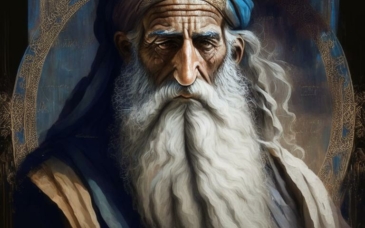"From whencesoever you start forth, turn your face in the direction of the Sacred Mosque; that is indeed the truth from your Lord. " {1}
The most sacred place in Islam is the Ka'ba in Mecca, Saudi Arabia. The Ka'ba is a mosque (built by Abraham according to Muslim tradition) constructed around a black stone. The prophet Muhammad designated Mecca as the holy city of Islam and the direction (qibla) in which all Muslims should offer their prayers. The Ka'ba is believed to be the first place that was created on earth {2} and the place at which heavenly bliss and power touches the earth directly. {3}
Mecca is located in the Hijaz region of western Saudi Arabia. The city lies inland 73 kilometers east of Jiddah, in the narrow, sandy Valley of Abraham. The Holy City is 277 meters (909 feet) above sea level. Each year, thousands of Muslims from around the world join in a pilgrimage to Mecca (the hajj), in fulfillment of one of the Five Pillars of Islam. The importance of Mecca for Muslims is inestimable. All Muslims, wherever they are on Earth, pray five times a day in the direction of the Kaaba in Mecca (located at 21° 25' 24" N and 39° 49' 24" E in DMS notation). The direction of prayer is known as the qibla.
The Religious Significance of Mecca
In addition to prayer, a pilgrimage to Mecca is required of every Muslim who can afford it as one of the Five Pillars of the faith. Every year about three million gather for the major pilgrimage, or Hajj, during the Muslim month of Dhu'l-Hijja, and many more perform the minor pilgrimage, or Umrah, at various times throughout the year.
Few non-Muslims have ever seen the rites and rituals of the Hajj, as non-Muslims are strictly prohibited from entering Mecca and Medina. Roadblocks are stationed along roads leading to the city. The most famous incident of a non-Muslim visiting Mecca was the visit by the British explorer Sir Richard Burton in 1853. Burton disguised himself as an Afghani Muslim to visit and write Personal Narrative of a Pilgrimage to Al Madinah and Mecca.
The focal point of Mecca is the Kaaba, the "House of God" believed by Muslims to have been built by Abraham and his son Ishmael, and which is covered in a gold-embroidered black fabric. Pilgrims circle the Kaaba seven times and may also try to touch or kiss its cornerstone, the Black Stone. Pilgrims may drink from the well of Zamzam. Its water of Zamzam is believed to have special properties. Few pilgrims return from the Hajj without a large plastic bottle of Zamzam water.
During the Hajj pilgrims travel to Mina, a small village, where the Devil, symbolised by stone columns, is ritually stoned. They then proceed to the hill Arafat (sometimes called a mountain, but with a height of only 70 m), a site for prayers, where Muhammad is believed to have delivered his final sermon.
The Masjid al Haram (Sacred Mosque) is for Muslims the holiest mosque on Earth. Both the mosque and the city itself are strictly off limits to non-Muslims.
Mecca or Makkah?
For most English speakers, "Mecca" has long been the accepted transliteration of the original Arabic for the holy city. The word Mecca in English has gone on to refer to any center of activity sought by a group of people with a common interest. Las Vegas, for example, is considered the "gambling Mecca" (even though gambling is strictly prohibited by Islamic law). Many Muslims find these out-of-context uses offensive. In an effort to distinguish between the metaphorical and official references to the holy site, the Saudi Arabian government began promoting a new transliteration, Makkah al-Mukkaramah, in the 1980s. Many English-speaking Muslims now consider this the preferred spelling, and closer to the original Arabic. While this new usage has been officially adopted by the U.S. Department of State, its spread is still incipient among anglophones at large.
References
- Qur'an 2:149.
- Encyclopedia of the Orient: Mecca.
- "Mecca." Encyclopedia Britannica. (Encyclopædia Britannica Premium Service, 2004).
- "Mecca." Wikipedia. 2005.;
External Links on Mecca
- Books on Mecca
Powells.com - Mosques Around the World: Makkah - IslamiCity
Images of Mecca (old and new), the Ka'ba, and the Black Stone. - History of the Ka'ba as a Place of Worship
Full-length article on the Ka'ba and Mecca in history and in the Qur'an. - Ka'aba the House of Allah - al-islam.org
- Mecca - Catholic Encyclopedia
Describes the history and significance of the city of Mecca. Note that this encyclopedia was published circa 1910, so still refers to Muslims as "Mohammedans" (this term is no longer used, as Muslims object to its implication that they follow Muhammad as opposed to God). - A Pilgrim's Progress - TIMEasia.com
A photo essay of the pilgrimage to Mecca from TIME magazine. - Mecca - Encyclopedia of the Orient
A helpful resource, but with annoying popup ads.
